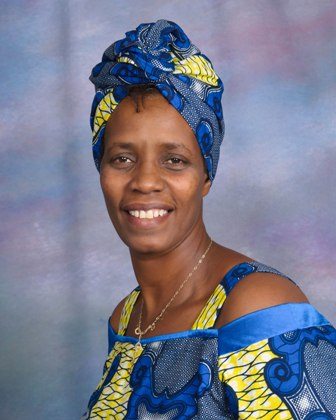Rose Mapendo

Rose Mapendo
Rose Mapendo is challenging the global community to accept peace and reconciliation. Mapendo has been honored by The White House, and in 2009 was named The Humanitarian of the Year by the United Nations High Commissioner for Refugees. Mapendo and her husband, born in the eastern Democratic Republic of Congo, had seven children when the Rwandan army invaded the Congo and war broke out in August 1998. In response to Rwanda’s invasion, Congo’s President Kabila demanded that certain ethnic groups inside Congo be killed. Mapendo and her family were targeted and arrested.
Her youngest child was still breastfeeding when they were imprisoned along with friends and relatives from their village. Soldiers separated Mapendo from her husband, and then executed him as Mapendo sat helplessly in a jail cell. A few months after her imprisonment, Mapendo realized that she was pregnant – with twins. By her eighth month of captivity, when she was suffering from severe malnutrition, Mapendo bore premature twin boys on her concrete prison floor. She was provided with no medical attention during thedeliveries. Believing that there is good in everyone, and as an extreme sign of forgiveness, Mapendo named her twins after two of her most brutal captors.
After being imprisoned for 16 months in the death camps, Mapendo and her children were flown to a refugee camp in northern Cameroon. Over the next six months the twins almost died on three occasions from malnutrition-related sicknesses. Ultimately, with the US government’s intervention, Mapendo and her family resettled in the United States. The twins are healthy young boys now. Mapendo’s children are all in school and she watched her oldest son graduate from high school in the spring of 2005.
Today, Mapendo is a global activist for peace and reconciliation and an in-demand motivational speaker. Along with her brother, Dr. Kigabo Mbazumutima, Mapendo co-founded Mapendo New Horizons – a non-profit organization committed to educating our global audience about the effects of war on women and children; providing much-needed assistance to the victims of war; offering underserved regions access to medical technology; and enlightening us all about society’s forgotten people. Mapendo’s story has been chronicled in the documentary film “Pushing The Elephant,” which premiered in New York City in June 2010. Her inspiring and heartfelt message is received by corporate, governmental and community groups around the world with tears and standing ovations at every turn.